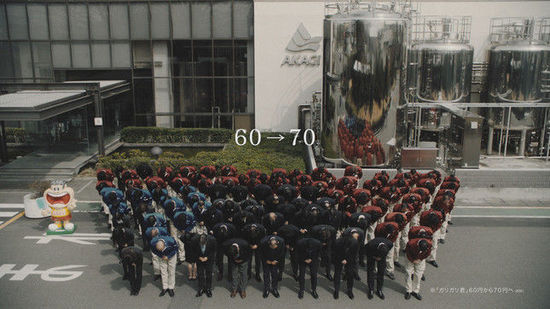Japan and the Paradox of Thrift
日本与节俭的悖论
Consumers living on fixed incomes have become intolerant of price hikes
以固定收入维持生活的消费者已经无法容忍价格上涨
When the maker of a popular Japanese popsicle decided to raise prices for the first time in 25 years, executives of Akagi Nyugyo Co.—which introduced the treat in 1981—felt a need to apologize to their customers.
日本冰冻甜品公司赤城乳业要给一款备受欢迎的冰棍涨价时,公司高管们感到有必要向他们的顾客道歉。这款冰棍由赤城乳业于 1981 年推出,其价格25年来从没改变过。
On the day of the hike, in April 2016, they ran a 60-second commercial showing the company's gray-haired chairman, backed by a phalanx of dark-suited workers, all bowing in deep contrition.
在2016年4月冰棍涨价当天,公司播放了一个60秒钟的广告。在广告中,白发苍苍的董事长身后站着一群身着黑色制服的员工,所有人都鞠躬致敬。
Three years later, the Akagi Nyugyo manager who came up with the idea for the ad is still feeling contrite.
三年后,赤城乳业那位为这个广告献策的经理仍然感到懊悔。
"It's not like people have any extra spending money," Fumio Hagiwara says.
“人们没有任何额外的支出资金,” Fumio Hagiwara说道。
Japan is the only developed economy where wages have dropped year after year.
日本是唯一一个工资逐年下降的发达国家。

Since 1996 inflation-adjusted pay has fallen about 13 percentage points—a big reason businesses are loath to raise prices or invest in a shrinking market.
自1996年以来,通胀调整后的工资下降了约13个百分点,这是企业不愿意提高产品价格或投资萎缩市场的一个重要原因。
The downward spiral has led to a "deflationary mindset" that Bank of Japan Governor Haruhiko Kuroda blames for thwarting his efforts to revive the economy, using every trick in the central bankers' playbook.
不断走低的趋势导致一种“通货紧缩的心态”。日本中央银行长黑田东彦在利用央行战术手册中的各种方法试图重振经济,他指责这种走低趋势挫败了他的各种努力。
Thrift has become so deeply ingrained in the Japanese psyche that a rare bump in the most recent round of seasonal bonuses paid to workers ended up powering a savings surge instead of a shopping spree.
节俭在日本人心中早已根深蒂固。最近一轮给员工发放季度性奖金时,出现了储蓄额激增,而非购物狂潮的罕见现象。
"It's not surprising when people have had negative wages for so long," says Michael Causton, an expert on Japanese spending patterns and co-founder of research firm JapanConsuming.
日本消费模式专家、市场调研公司JapanConsuming的联合创始人迈克尔·考斯顿表示,“当人们的工资一直处于负增长状态时,出现这种现象不足为奇。”
After six recessions in 30 years, figuring out ways to save money has turned into a national obsession.
在30年间经历了六次经济衰退之后,日本民众都痴迷于寻找省钱的方法。
One television show, Cocorico Creates a Legend, scored a hit in the mid-August by challenging celebrities to survive for a month on a $3-a-day budget
综艺秀《黄金传说》(Cocorico Creates a Legend),在8月中旬播出过超受欢迎的节目,内容是让明星挑战每天以3美元的预算生活一个月。
—black humor for a still-rich country where living standards are slowly eroding and the poverty rate has crept up to a more U.S.-like 16 percent.
日本仍然是个富庶的国家,但其民众的生活水平在缓慢下降,贫困率也攀升至16%,与美国相类似。此时播出这个节目,无疑算是种黑色幽默。


